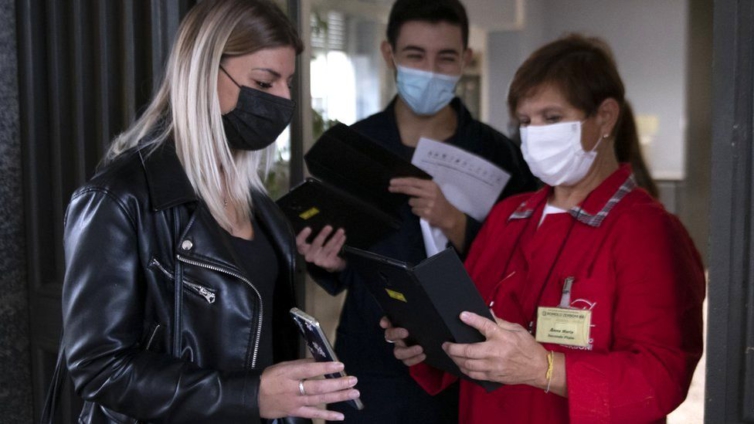Italy is to make it compulsory for all workers to have a Covid "green pass" - proof of vaccination, a negative test or recovery from the virus.
The measures are a first for Europe and some of the strictest in the world.
Anyone without a pass will reportedly face suspension from work and may have their pay stopped after five days.
The measure, due to come into force on 15 October, aims to boost vaccinations in a country that has been badly hit by the virus.
Green pass certificates for Covid-19, provided both digitally and on paper, are already required to access Italian train stations, cinemas, restaurants, gyms and swimming pools.
School staff are also required to show a pass and some teachers have reportedly been turned away from work.
On Thursday, the Italian government approved a new law to extend the requirements to all workplaces and employees across all sectors, including the self-employed.
Businesses and staff could face fines of up to €1,500 (£1,280) if people are found to be working without a valid green pass.
Announcing the decision, Health Minister Roberto Speranza said the new measures would improve safety and "make our vaccination campaign even stronger".
"The implementation of a pass such as the one we are bringing into force with this decree will, we are certain, help us push forward this vaccination campaign," he said.
Despite a vocal anti-vaccination minority, Italians have broadly backed the government's vaccination campaign.
Nearly 65% of Italians have now been fully vaccinated, but infections have been rising, driven by the Delta variant.
Italy has recorded more than 4.6 million cases of Covid-19 and over 130,000 coronavirus-related deaths since the start of the pandemic, according to Johns Hopkins University data.
The green pass was initially introduced to make travel within the EU more efficient, and several countries have since introduced requirements for people to show the certificate for different reasons.
France requires a health pass for access to restaurants, bars, planes and trains, while Austria and Cyprus are among other EU countries to have used similar schemes.
Latest Stories
-
Alan Kyerematen saddened by NDC and NPP’s neglect of Krofrom Market in the Ashanti Region
3 mins -
CSIR Executive Director urges farmers to adopt technology for improved farming
17 mins -
Football Impact Africa’s Ghetto Love Initiative inspires change in Teshie
28 mins -
Peter Toobu calls for tighter border security over uncovered weapons at Tema Port
30 mins -
Gov’t has failed its commitment to IPPs – Ablakwa
34 mins -
Sell Chrome to end search monopoly, Google told
46 mins -
KATH to install seven new dialysis machines by end of November
49 mins -
Walewale: Police confiscate 37 bags of cocoa beans suspected of being smuggled out of Ghana
1 hour -
‘Expired’ Rice Scandal: FDA confirms rice was safe for consumption after rigorous lab tests
1 hour -
Many women have experienced intimate partner violence – Angela Dwamena Aboagye
1 hour -
Power challenges persist due to government’s mismanagement of revenues – Okudzeto Ablakwa
2 hours -
Jordan Ayew injury not as bad as feared – Leicester City boss
2 hours -
Stonebwoy heads to North America for UP & RUNNIN6 tour
2 hours -
FDA explains extension of best-before date for ‘expired’ rice
2 hours -
Rebecca Akufo-Addo, Mahama storm Akuapem North as NPP NDC slugs it out
2 hours

